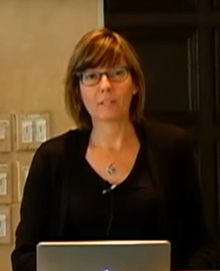Alice Dreger | |
|---|---|
 Dreger in 2015 | |
| Born | Alice Domurat Dreger United States |
| Education | State University of New York, Old Westbury (BA) Indiana University, Bloomington (MA, PhD) |
| Known for | |
| Awards | John Simon Guggenheim Memorial Foundation Fellowship[1] |
| Scientific career | |
| Fields | Bioethics, humanities |
| Institutions | Northwestern University, Michigan State University |
| Website | alicedreger |
Alice Domurat Dreger (/ˈdrɛɡər/) is an American historian, bioethicist, author, and former professor of clinical medical humanities and bioethics at the Feinberg School of Medicine, Northwestern University, in Chicago, Illinois.[2]
Dreger engages in academic work and activism in support of individuals born with atypical sex characteristics (intersex or disorders of sex development) and individuals born as conjoined twins.[3] She challenges the perception that those with physical differences are somehow "broken" and need to be "fixed".[4] She has opposed the use of "corrective" surgery on babies whose genitalia are considered "ambiguous". She has criticized the failure to follow such patients in later life and reported longer-term medical and psychological difficulties experienced by some of the people whose sex is arbitrarily assigned.[3][5]
She supported J. Michael Bailey in the face of controversy over his book The Man Who Would Be Queen.[6][7][8] In a 2008 article and in her 2015 book, Galileo's Middle Finger, Dreger argued that the controversy had gone far beyond addressing the scientific theories presented in Bailey's book to become an attack upon the author.[8][3]
Dreger has been a featured speaker at TED talks. She has also worked as a journalist, founding East Lansing Info, a website that covers local affairs in East Lansing, Michigan.[9][10]
- ^ "ISIR 2015 Holden Award Address: Alice Dreger". International Society for Intelligence Research (ISIR). Retrieved October 12, 2015.
- ^ "Alice Dreger Bio". Northwestern University. Archived from the original on April 19, 2014. Retrieved April 28, 2014.
- ^ a b c Meyer, Michal (2015). "Identity Politics". Distillations. 1 (4): 40–43. Archived from the original on March 27, 2018. Retrieved March 26, 2018.
- ^ Cite error: The named reference
Sharpwas invoked but never defined (see the help page). - ^ Feder, Ellen K.; Dreger, Alice (May 2016). "Still ignoring human rights in intersex care". Journal of Pediatric Urology. 12 (6): 436–437. doi:10.1016/j.jpurol.2016.05.017. ISSN 1477-5131. PMID 27349148.
- ^ Bartlett, Tom (March 10, 2015). "Reluctant Crusader: Why Alice Dreger's writing on sex and science makes liberals so angry". Chronicle of Higher Education. Retrieved March 14, 2015.
- ^ Dobbs, David (April 17, 2015). "'Galileo's Middle Finger', by Alice Dreger". The New York Times. Retrieved September 8, 2015.
- ^ a b Dreger, Alice D. (April 23, 2008). "The Controversy Surrounding The Man Who Would Be Queen: A Case History of the Politics of Science, Identity, and Sex in the Internet Age". Archives of Sexual Behavior. 37 (3): 366–421. doi:10.1007/s10508-007-9301-1. ISSN 0004-0002. PMC 3170124. PMID 18431641.
- ^ "Speakers Alice Dreger: Historian". TED. Retrieved February 22, 2013.
- ^ "ELi's Board of Directors". East Lansing Info. Retrieved February 24, 2019.
